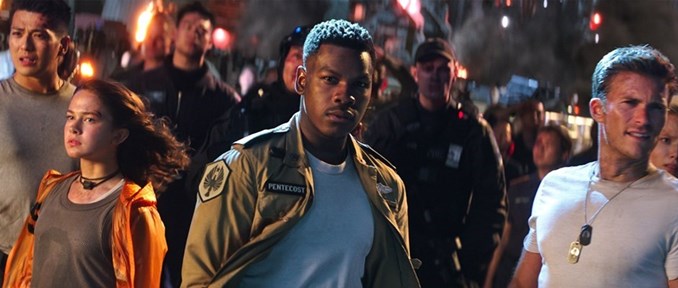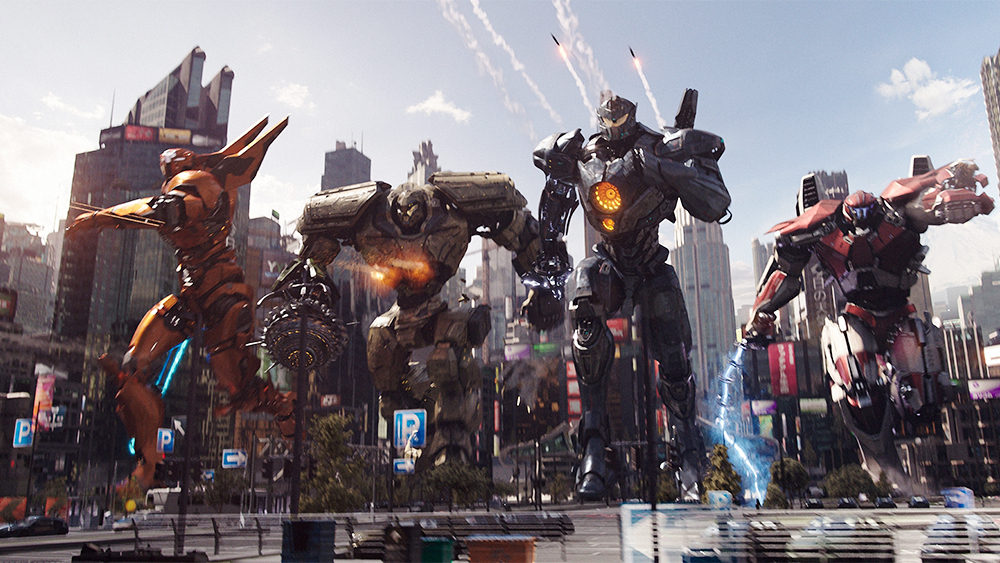Pacific Rim: Uprising (2018)
DIRECTOR: Steven S. DeKnight
CAST: John Boyega, Scott Eastwood, Cailee Spaeny, Charlie Day, Burn Gorman, Tian Jing, Rinko Kikuchi
REVIEW:
Among superfluous sequels slapped-together because the original was deemed to make sufficient profits (2013’s Pacific Rim did not do that well in the US, but was big in China, which persuaded Universal and Chinese-owned Legendary Pictures to cough up the money for a second installment), Pacific Rim: Uprising is at least a fresher and more enjoyable experience than the tired, low energy likes of Independence Day: Resurgence or London Has Fallen. The first Pacific Rim was not a great movie, but Guillermo Del Toro crafted it as an obvious passion project and a love letter to both the anime and kaiju—Japanese monster movie—genres (probably why it was more popular in Asia than the United States), and served up a smorgasbord of geeky fun for those who simply delighted in the big-budget, splashy special effects-filled spectacle of giant monsters duking it out with giant robots. Like many sequels, Uprising tries to serve up bigger—the climactic battle royale pits four Jaeger robots against a supersized kaiju—but serves up enough of more of the same to entertain fans of what the first had to offer. If you’re the audience for this, you probably know who you are by now.
After a quick recap of the first movie—for the uninitiated, aliens from another dimension sent giant monsters through an underwater interdimensional breach to wreak havoc on mankind, but were ultimately defeated by giant pilot-controlled “Jaeger” robots—we pick up ten years after the end of the war. While the world has largely moved on, new recruits are still being trained by war veteran Jaeger pilots and corporate CEO Liwen Shao (Tian Jing) is set to unveil a new drone army with the help of scientist Newton Geiszler (Charlie Day), leaving some pilots fearing they’ve become obsolete (though anyone who thinks the drones are going to function smoothly hasn’t seen many sci-fi movies). Our hero this time around is Jake Pentecost (John Boyega), the son of the late Marshal Stacker Pentecost (played by Idris Elba in the first film), who sacrificed himself heroically in battle ten years ago, but Jake is a bottom-feeding academy dropout who makes a living scavenging, stealing, and selling Jaeger technology on the black market, activities which lead him to a chance run-in with teen prodigy Amara Namani (Cailee Spaeny), who has constructed her own mini-Jaeger. When they both get arrested by the authorities, it’s Jake’s familial connection with his adopted sister Mako Mori (Rinko Kikuchi), now a high-ranking military official, and Amara’s technological prowess that gets them both unwillingly recruited into the Jaeger program under veteran Nate Lambert (Scott Eastwood). But when a rogue Jaeger makes a surprise assault, and a larger conspiracy turns out to be afoot (on the human side this time), Jake and Amara will have to step up to the plate.
As before, the film is populated by stock character types, the dropout and hero’s son who gets a shot at redemption, the plucky tough girl, the one-dimensionally surly comrade-in-arms who first heaps scorn on the rogue but ultimately becomes a brother in time for the climactic battle (kind of this sequel’s equivalent of Rob Kazinsky in the first movie), etc. Anyone with an attachment to the original characters is in for steep disappointment. Idris Elba’s late character wouldn’t have been reasonably expected to reappear (though we see his memorial portrait), but Charlie Hunnam’s Raleigh Becket, the protagonist of the first movie, is MIA (apparently Hunnam at one point was intended to return but when he became unavailable due to scheduling conflicts, the script was tweaked to replace him with Scott Eastwood’s character). Most irritating is the treatment dealt out to Rinko Kikuchi’s Mako Mori, arguably the standout and most human character of the first movie, who only returns in a small role and is then peremptorily disposed of in shabby fashion (she doesn’t even get to go down heroically in battle). The shoddy way Uprising treats the first movie’s tough and reasonably well-developed heroine is a sore sticking point that’s bound to rankle some returning fans. The only other returning veterans are Burn Gorman and Charlie Day’s bickering scientists, and one of them gets taken in an unexpected direction.
On the plus side, while Uprising isn’t anything deep or substantial (though, in honesty, neither was the first movie), it’s a blast when things kick into high gear, serving up more of the same geeky fun of watching giant robots duke it out with each other and eventually with giant monsters (as I said about the first movie, it’s essentially Transformers, Godzilla, and Gundam thrown into a blender). The fight scenes are souped-up this time around, with four Jaegers versus a mega kaiju, a rogue Jaeger and a conspiracy thrown into the mix to spice things up, and a climactic showdown on the slopes of Mt. Fuji. The movie’s human elements aren’t likely to bring tears to anyone’s eyes, but when the action kicks in and especially when the kaiju rear their heads again, Uprising is great fun.
 Released from the confines of the vaguely bumbling sidekick Star Wars relegates him to, John Boyega shows a charismatic and engaging presence and capably navigates the cliched character arc of the rogue-turned-hero (playing the son of Idris Elba, he’s also allowed to retain his British accent, whereas Star Wars rather arbitrarily had him sporting an American one). In fact, seeing Boyega allowed to go into bad-ass action hero mode here makes it even more evident how much he was recently sidelined and ill-used in The Last Jedi. He’s nicely paired with plucky newcomer Cailee Spaeny, with whom he generates an effective (platonic) chemistry. Scott Eastwood at times seems to be doing an impression of his own father Clint Eastwood, but while the physical resemblance is striking, he doesn’t have “it”. Charlie Day and Burn Gorman are the only returning cast members with significant roles, and manage to be less annoying this time around. With Rinko Kikuchi relegated to a thankless bit part, it falls to Chinese star Tian Jing to replace her in the Asian action heroine contingent. As in the first movie, the gaggle of fellow cadets Amara spends time with are so underdeveloped as to generate no reaction when some of them ultimately fall in battle. While John Boyega arguably supplies a hero with more charisma and panache than the first film’s Charlie Hunnam, no one else makes much of an impression apart, somewhat, from Amara, and she’s not nearly as fleshed out as Mako was in the first movie (despite getting a similar kaiju-centric tragic childhood backstory related via flashback).
Released from the confines of the vaguely bumbling sidekick Star Wars relegates him to, John Boyega shows a charismatic and engaging presence and capably navigates the cliched character arc of the rogue-turned-hero (playing the son of Idris Elba, he’s also allowed to retain his British accent, whereas Star Wars rather arbitrarily had him sporting an American one). In fact, seeing Boyega allowed to go into bad-ass action hero mode here makes it even more evident how much he was recently sidelined and ill-used in The Last Jedi. He’s nicely paired with plucky newcomer Cailee Spaeny, with whom he generates an effective (platonic) chemistry. Scott Eastwood at times seems to be doing an impression of his own father Clint Eastwood, but while the physical resemblance is striking, he doesn’t have “it”. Charlie Day and Burn Gorman are the only returning cast members with significant roles, and manage to be less annoying this time around. With Rinko Kikuchi relegated to a thankless bit part, it falls to Chinese star Tian Jing to replace her in the Asian action heroine contingent. As in the first movie, the gaggle of fellow cadets Amara spends time with are so underdeveloped as to generate no reaction when some of them ultimately fall in battle. While John Boyega arguably supplies a hero with more charisma and panache than the first film’s Charlie Hunnam, no one else makes much of an impression apart, somewhat, from Amara, and she’s not nearly as fleshed out as Mako was in the first movie (despite getting a similar kaiju-centric tragic childhood backstory related via flashback).
Viewers with modest expectations will likely be satisfied by what Uprising has to offer. I admittedly went in for completist reasons, having already had a review of the first film in my archives. I went in expecting to be underwhelmed by a “meh” sequel, and was pleasantly surprised to find it engaging and enjoyable. Uprising is flawed—even as a sequel to a movie which itself wasn’t objectively that great, it loses some of the character-building and heart, along with some of Guillermo Del Toro’s trademark quirky touch, compared to Steven S. DeKnight’s competent but undistinguished direction—but it’s a fun ride.
* * 1/2
